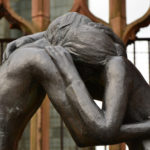We run our website the way we wished the whole internet worked: we provide high quality original content with no ads. We are funded solely by your direct support. Please consider supporting this project.

Are You Fully Alive? Here’s the Key
Image by rashdada via flickr.
The cross reveals the full truth about us. This truth reconnects us with our true source of life, which in turn heals our idol addictions. This dimension of the cross is frankly so breathtakingly beautiful that, so far as I can tell, very few followers of Jesus have ever really grasped it. And it contains the secret to living a fully alive life.
You know what something is worth to someone by what they are willing to pay for it. Consider, then, what God was willing to pay to redeem us and make us his bride. Out of his love for us, the all-holy God was willing to do nothing less than to go to the extremity of becoming our sin (2 Cor 5:21) and becoming our God-forsaken curse (Gal 3:13). Which means that God’s love for us led him to the extreme of somehow becoming his own antithesis. It means, in other words, that God gave us the perfect revelation of his true loving nature as well as the perfect revelation of his love for us by somehow becoming anti-God!
God could not have gone further than he in fact did to free us from our bondage and make us his bride. If the worth of something or someone to another is determined by what they are willing to pay to acquire it, then the fact that God was willing to pay the greatest price that could possible be paid can only mean that we have the greatest possible worth to God. The unsurpassable price God paid for us, in other words, means that we have unsurpassable worth to God.
Which means God could not possibly love us more than he actually does, and we could not matter more to God than we actually do.
Another way of saying this is to say that God loves us with the very same love that God eternally is. Calvary is what the love of the Trinity looks like when it encompasses us. Jesus reflects this truth when he prays that we would know that the Father loves us with the very same love he has for his own eternal Son (Jn 17:26).
We are not going too far if we conclude that God loves us with the same love he has for himself as Father, Son and Spirit. The God whose love led him to go to the infinite extreme of offering up his Son to become our sin and our God-forsakenness also gives us, as a result of this unsurpassable sacrifice, “all things”—including, full participation in the loving community that God eternally is (Rom 8:32).
The most remarkable aspect of God’s promise to always ascribe unlimited worth to us is that God promises this “while we were still sinners” and were positioning ourselves as his enemy (Rom 5:8, 10)! In fact, God made this promise precisely by becoming our sin and by standing in our place as a God-forsaken enemy! This clearly demonstrates that the unsurpassable worth God ascribes to us isn’t based on anything positive he finds in us, and it can’t be lessened by anything negative he finds in us. The cross rather demonstrates that God’s love for us, and our priceless worth to him, are completely based on God’s character, not ours. Even when we are in bondage to sin and are thinking, feeling, and/or acting like God’s enemies, we can trust that it remains as true as ever that we could not be loved more than we actually are, and could not matter more to God than we actually do.
There is nothing that fills my heart with a greater sense of joy, peace, and confidence than the realization that God’s perfect, unsurpassable, unwavering love for me is also unconditional. The person who has allowed this unconditional love to form the core of their self-identity is a person who will remain unshakable in their sense of being fully alive, regardless of what life may throw their way.
—Adapted from Benefit of the Doubt, pages 240-242.
Category: General
Tags: Benefit of the Doubt, Cruciform Theology, Fully Human, Life to the Full, Love, Love of God, Trinity
Related Reading

Sermon Clip: The Cross and the Tree
In this short sermon clip, Greg Boyd discusses how Christians should react to the world with love. In the Garden of Eden, Adam and Eve were tempted to eat from the Tree of the Knowledge of Good and Evil. They did this because they didn’t understand that God was protecting them. In this sermon, Greg…

How do you explain the violent judgement of Ananias and Sapphira?
Question: You talk a lot about the violent depictions of God in the Old Testament. But what about God’s slaying of Ananias and Sapphira in the New? How do you explain that? Answer: The same way I explain divine violence in the Old Testament. There’s simply no reason to think the cruciform hermeneutic (reading Scripture…

The Rule of Love
The traditional confession that Scriptura sacra sui ipsius interpres (“Sacred Scripture is its own interpreter”) presupposes that there is one divine mind behind Scripture, for example. Moreover, Church scholars have traditionally assumed that Scripture’s unity can be discerned in a variety of concepts, motifs, themes and theologies that weave Scripture together. And to speak specifically of the…

A Word About Sharing the Gospel From an Atheist
Jen J over at A Deeper Family wrote a little piece about how she felt convicted after this video was played during a sermon at her church. She makes some good points. Penn Jillette is a famous atheist, and I’m sure he encounters a lot of Christians trying to persuade him to come to God. It’s…

The Coming Kingdom & Racial Conflict
In the book of Revelation, we see a glimpse into the future. John says he saw, …a great multitude that no one could count, from every nation, tribe, people and language, standing before the throne and in front of the Lamb. They were wearing white robes and were holding palm branches in their hands. And…

Winners!
Last month we launched our first e-newsletter for ReKnew and decided to give away ten copies of Greg’s book Benefit of the Doubt to celebrate. Here are the winners: Jerry from Round Lake, Illinois Josh from Saint Paul, MN Jane from Medford, Oregon Ian from London, UK Randy from Milwaukie, Oregon Beth from Pasadena, California…
